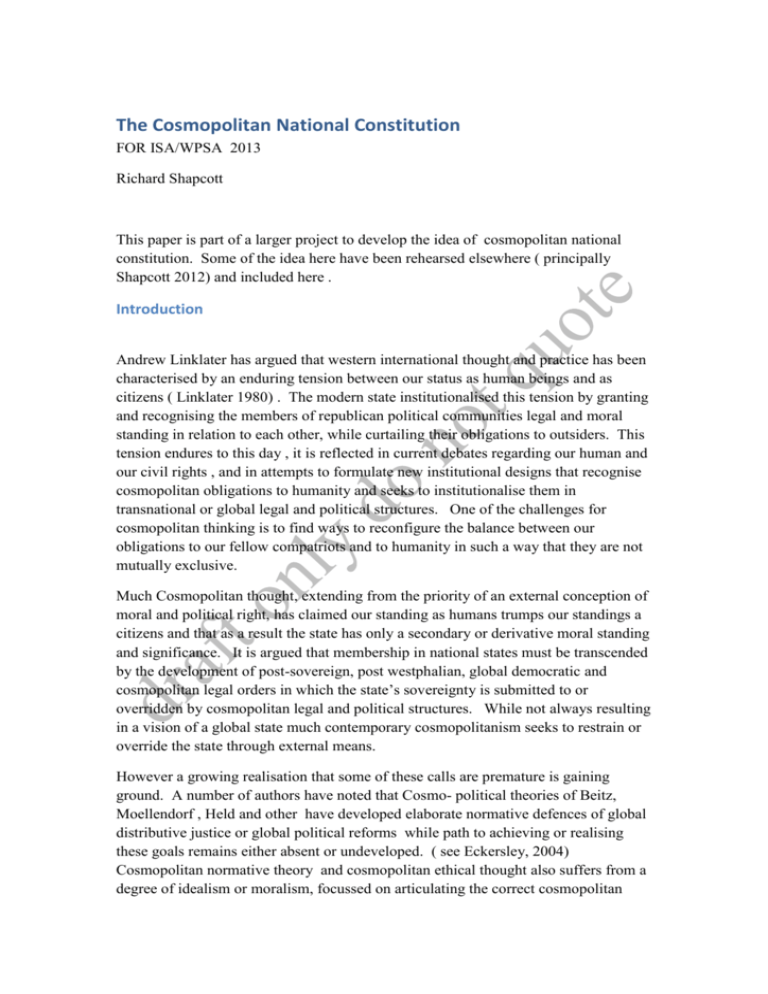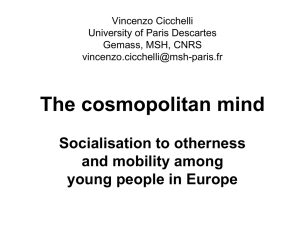Cosmopolitan states isa wpsa 2013
advertisement

The Cosmopolitan National Constitution FOR ISA/WPSA 2013 Richard Shapcott This paper is part of a larger project to develop the idea of cosmopolitan national constitution. Some of the idea here have been rehearsed elsewhere ( principally Shapcott 2012) and included here . Introduction Andrew Linklater has argued that western international thought and practice has been characterised by an enduring tension between our status as human beings and as citizens ( Linklater 1980) . The modern state institutionalised this tension by granting and recognising the members of republican political communities legal and moral standing in relation to each other, while curtailing their obligations to outsiders. This tension endures to this day , it is reflected in current debates regarding our human and our civil rights , and in attempts to formulate new institutional designs that recognise cosmopolitan obligations to humanity and seeks to institutionalise them in transnational or global legal and political structures. One of the challenges for cosmopolitan thinking is to find ways to reconfigure the balance between our obligations to our fellow compatriots and to humanity in such a way that they are not mutually exclusive. Much Cosmopolitan thought, extending from the priority of an external conception of moral and political right, has claimed our standing as humans trumps our standings a citizens and that as a result the state has only a secondary or derivative moral standing and significance. It is argued that membership in national states must be transcended by the development of post-sovereign, post westphalian, global democratic and cosmopolitan legal orders in which the state’s sovereignty is submitted to or overridden by cosmopolitan legal and political structures. While not always resulting in a vision of a global state much contemporary cosmopolitanism seeks to restrain or override the state through external means. However a growing realisation that some of these calls are premature is gaining ground. A number of authors have noted that Cosmo- political theories of Beitz, Moellendorf , Held and other have developed elaborate normative defences of global distributive justice or global political reforms while path to achieving or realising these goals remains either absent or undeveloped. ( see Eckersley, 2004) Cosmopolitan normative theory and cosmopolitan ethical thought also suffers from a degree of idealism or moralism, focussed on articulating the correct cosmopolitan Shapcott, Cosmopolitan national constitutions, WPSA 2013 moral stance on applied ethics rather than how this may be put into practice or how states may be persuaded to take up cosmopolitan obligations. Putting this slightly differently cosmopolitan political theory has sought to identify the nature and structures of cosmopolitan world order. As such it has tended towards the visionary but also the idealist. Andrew Linklater argued that the cosmopolitan project required three types of enquiry, the first was the normative defence of the principle of universalism and inclusion, the second was a sociological enquiry into the forces favouring or limiting universalism in different eras and contexts of human history and the third was a praxeological study into how new forms of solidarity, institutionalism and community could be developed which facilitated greater inclusion (Linklater 1990). In these terms cosmopolitan thought has largely focussed on the normative stage of thinking and insufficiently on the praxeological dimensions, and even when focussed on praxeological dimensions, i.e. designing or advocating new forms of institutional arrangement that reflect cosmopolitan values, they remain too abstract and removed the world we inhabit , i.e. from where we must start to think about applying cosmopolitanism. In a recent piece on cosmopolitan legal theory Garrett Brown captured the nature of the problem and argued Cosmopolitan legal theory, and cosmopolitan political theory, struggle to adequately articulate the means whereby cosmopolitan normative insights can be adequately applied in the contemporary world (Brown 2008). Thus Brown argues that cosmopolitan legal and moral theory needs to pay more attention to the praxeological task of cosmopolitanism by downplaying the emphasis on ideal theory and engaging with the task of how to instantiate cosmopolitanism now, based on the argument that “any reasonable move to a cosmopolitan order would have to come from current circumstances.” (Brown, 2011 P54). Likewise Carlos Corduourier Real’s account of transnational social justice has also made similar criticism of the ideal theory accounts of global justice such as Beitz and Moellendorf . He argues that “the characteristics of the current international system demand us to reason in terms of non-ideal theory if we aim to assess prevailing practices from the point of view of justice and, similarly, to suggest contextreasonable institutional reforms that could be implemented right away…. Theoretical approaches developed along idealized cosmopolitan institutions seem to be inadequate inasmuch as they tend to overlook the circumstances in which normative arrangements are politically possible. ” (Cordourier-Real, 2010 p100) As a result both Brown and Cordourier Real argue that this directs us towards the possibilities inherent within modern states and for overcoming the “overall neglect regarding the specific roles states can have in grounding a cosmopolitan condition and what normative requirements a cosmopolitical state would need to satisfy internally and externally in order to satiate the moral, legal and institutional demands of cosmopolitanism.” (Brown 2011 54) Because the state remains the principle vehicle of political action and engagement as well as the locus 2 Shapcott, Cosmopolitan national constitutions, WPSA 2013 of institutional and democratic power in the contemporary world this requires cosmopolitan thought to engage seriously with its possibilities. Thus when addressing the problem of global distributive justice for instance “it becomes necessary to count on the political means of the state to address both local and global injustice. It is, therefore, important to keep the focus on states in order to be clear about who is failing to accomplish obligations of justice. “ (Cordourier-Real, 2010 p112) The principle task of this paper is to take up this challenge to examine and “outline what cosmopolitan values a state may still provide, what a normatively responsible cosmopolitan state might actually look like and how responsible cosmopolitan states could help ground a cosmopolitan condition.” (Brown 2011 54) This paper is an attempt to engage in the praxeological tasks, it investigates a possible way of institutionalising cosmopolitan values into existing institutional structures, in particular the practices of the nation state. In particular this paper examines the possibility that states can institutionalise a cosmopolitan harm principle into their national constitutions. The paper is concerned in the first instance in examining the grounds for transforming the national constitution and extending it to consideration of outsiders. It begins with a brief engagement with the arguments in favour of a cosmopolitan legal order and other transnational forms of cosmopolitanism. It then rehearses the cosmopolitan argument against the social contract and argues that this requires investigation into the ways in which the domestic contract can be made more inclusive. It identifies discourse ethics as a principle which supports the extension of consultative and communicative measures to outsiders. It then argues that cosmopolitanism requires states to extend their consultation hierarchies , and other legal instruments to include the interest of nonmembers of the social contract and argues that the domestic constitution is the means for doing this. Cosmopolitan constitutions and cosmopolitan legal orders. At this point it is useful to distinguish my claim from those made by others when they refer to the idea of a cosmopolitan constitution and to spell out some of the advantages of this approach . Arguably the core idea of cosmopolitanism is the universal equality and value of the individual , this translates into the idea of universal law, that legal rules ought to incorporate moral right , ie the status of individuals as ends, thus a cosmopolitan world order or legal order is one in which legal rules apply transnationally. Hence the argument for transnational cosmopolitan constitution as a way to embed this recognition in international forums. A number of current strands in cosmopolitan thought have discussed the idea of cosmopolitan principles being embedded in domestic law, most commonly in the context of the European Union’s human rights policy (Stone Sweet, 2012, Benhabib 2006). Benhabib has presented the case for what 3 Shapcott, Cosmopolitan national constitutions, WPSA 2013 she calls cosmopolitan federalism whereby states incorporate cosmopolitan hospitality norms recognising the human, and not just civil, rights of non-citizens and ‘resident aliens’ thus anchoring domestic law in international or cosmopolitan law. European immigration and citizenship laws are being incorporated into the national laws or overriding them, in European states. These are all versions of what StoneSweet calls a cosmopolitan legal order understood as “a transnational legal system in which all public officials bear the obligation to fulfill the fundamental rights of every person within their jurisdiction, without respect to nationality or citizenship.” (Stone-Sweet, A. (2012). The emphasis in most of these accounts is on a transnational form of legal /institutional order can be embedded or used to complement or supersede national law. The cosmopolitanism of these cases is also largely domestic or concerned with rights of ‘outsiders’ once they have arrived. Domestic legal requirements then perform the task of constraining state action in the domestic realm in accordance with cosmopolitan right. In this view states become more cosmopolitan by having their legal sovereignty supplemented or superseded by a transnational legal order called a cosmopolitan constitution.( Brown 2009) Critique of cosmopolitan constitution Without wanting to reject the arguments of brown, stone sweet or Benhabib, I nonetheless want to make two observations about this approach. The first is to address the question of its universal applicability and its democratic legitimacy. If we are looking to make cosmopolitanism more realisable in the here and now, even the modest argument for a ( transnational) cosmopolitan legal order has only limited appeal. This is in part because while it applies in the context of Europe, where there has been a transnationalising of law and citizenship underway for more than 50 years, in most other parts of the world this is not the case. Indeed in most other parts of the world states resist surrendering to transnational law. While we can accept that European states have gone further than most others in accepting and transforming their constitutional practices into a cosmopolitan legal order, in which European wide legislation and jurisdiction applies, ie in which states accept European law as qualifying national law, we must ask whether such a transformation is possible anywhere else in the foreseeable future. The particular circumstances of the European transformation are far from being repeated elsewhere. Is it possible to imagine the United States, China, or Russia ever accepting such an order? While they may participate in international trade regimes which limit their domestic capacities for action it is unlikely that this will occur in relation to civil or criminal law. The US for instance has an ongoing debate about whether and in what ways foreign laws, or jus gentium , applies to its domestic law, as either an example, or as law. My point is that if we are interested in examining how states can be transformed into responsible cosmopolitans we need to address the terms of political discourses within 4 Shapcott, Cosmopolitan national constitutions, WPSA 2013 them and the domestic political structures and cultures to look for resources that are amenable to such change. In other words my argument is the focus of the cosmopolitan constitutional literature is putting the cart before the horse because The idea of a CLO also comes across problems of legitimacy. The principles of republicanism and democracy at the heart of much cosmopolitanism suggest rules that touch all should be made by all ( all involved principle) yet the idea of CLO , does not necessarily include that democratic element, in the case of the EU there is a significant democratic deficit that threatens the legitimacy and viability of that organisation and of its laws. This is not a call for or against the idea of more robust European parliament . Rather my point is that the CLO is limited by the nature of the political legitimacy of the republican state as an expression of a legitimate social contract. Most states and their citizens believe themselves to be founded on largely internal conceptions of obligation and legitimacy. While There is evidence of growing sense that we are members of a community of human kind as well as of our own community, and that we should take care to not harm others unnecessarily ( see Linklater). However this is distinct from the idea that we form a global political community where we all collaboratively make the laws together. The state gets it lawmaking authority from it citizens and no one else. To adopt a cosmopolitan legal order, requires accepting legal rules that come from outside, even in the instance where one’s own state has helped write those laws In other words the cosmopolitan legal order has dubious democratic legitimacy even if it coheres and conforms to abstract cosmopolitan right. So any cosmopolitanism needs take account of the source of legitimacy and the importance of political community. ( for recent attempt at this see Cohen, 2012). For better or worse we live in a world of states many of them republican in some form or another, where most of the people of the world accept that they should be governed by rules that they have made, i.e. that are made for and by their communities. So it follows then that domestic, properly legitimate states, are the appropriate place to make cosmopolitan law until such time as democratic cosmopolitan legislative bodies emerge. Given this the question of cosmopolitan praxis needs to be directed towards pursing solutions from within the state itself. In the case of those states unwilling or unlikely to adopt or submit to a CLO, we must ask how they might unilaterally become more cosmopolitan. In particular what legal institutional responses might they have to cosmopolitan condition of interdependence? This leads to the second and more substantive point and the focus of the remainder of this paper. The idea of cosmopolitan constitution sees republican states entering into a situation where they accept transnational cosmopolitan law as part of their domestic legal framework, and surrender part of their autonomy to that law. According to the Kantian tradition republican states are inherently respectful of their own citizens rights, they are constituted that way, The CLO attempt to apply this cosmopolitan 5 Shapcott, Cosmopolitan national constitutions, WPSA 2013 law to outsiders within states boundaries, so that non citizens get rights. However while this is perhaps a necessary part of a transition to a cosmopolitan world order necessary it does not address arguably more pressing concern of how states can take responsibility for the rights of outsiders beyond their borders. The cosmopolitanism of the cases addresses by Benhabib , Stone-Sweet and others is largely domestic , concerned with the rights of ‘outsiders’ once they have arrived within a state’s jurisdiction and is therefore a matter of domestic law. It is not directed explicitly towards the foreign policy or external actions of states, that is towards the harm the political community does outsiders. While certainly in line with cosmopolitan thought it says little about how states should treat outsiders, that is those not on their territory beyond their sovereign jurisdiction. It is the routine disregard of the interests of outsiders that is the biggest moral problem for cosmopolitanism because outsiders, extra-territorials , receive no protection from the republican constitution until they enter its territory. More specifically the biggest moral deficit arising from the division of the world into separate sovereign states is that states are able to avoid much responsibility for their actions, and the actions of their citizens, abroad. This is the concern of this paper. In order to better see this we need to turn to the cosmopolitan critique of the social contract as an act of exclusion. Cosmopolitan critique of social contract. The turn to the CLO and the Kantian conception of Cosmopolitan constitution extend in part from the Kantian critique of social contract theory. Social contract theorists address the nature and justification of this social contract and emphasise it as a conceptual tool for understanding the nature of state legitimacy. National constitutions and national laws are generally seen as the prerogative of domestic populations and an expression of national values. The social contract provides the grounds of mutual obligation between the contractors and also limits those obligations only to other contractors. For cosmopolitans this is inadequate because the social contract takes no account of the interest of outsiders and institutionalises differentiation between inside and outside, between our status as men ( sic) and citizens. As Linklater noted "Unlike Pufendorff and Vattel, who had grounded political obligation in the previous consent of contractors, kant derived obligation immediately from moral duty. The duty to belong to the state emanated from the fact that the pursuit of any one mans's happiness and security should not be incompatible with the equal liberty of others. And because this was so, the state could not be considered a sufficient juridical community ; the primary importance of justice required that outsiders too be brought within a common moral framework." Linklater 1990 p 10). In the cosmopolitan constitution this inclusion take the form of the transnational legal order. 6 Shapcott, Cosmopolitan national constitutions, WPSA 2013 The cosmopolitan position is that the obligations that contractors may have to each other do not exhaust their moral duties or remove any obligations they may have to outsiders. Henry Shue takes a representative cosmopolitan position when he argues "... it is impossible to settle the magnitude of one's duties in justice (if any) toward the fellow members of one's nation-state…prior to and independent of settling the magnitude of one's duties in justice (if any) toward non members' (Shue, 1983, 603). Cosmopolitans argue, following Kant that while the special duties we owe compatriots are indeed special duties they are not exhaustive of our general cosmopolitan duties to humanity: ‘special associations can increase what we owe our associates but they cannot decrease what we owe everyone else’ (Pogge 2002, 91). Thus Pogge in recognising the point of liberal nationalist like miller that social contract creates special associative duties also claims that this does not relieve us of duties to humanity. For Pogge this is primarily our negative duties to not harm outsiders. The problem for cosmopolitans is not that separate social contracts are always unjustifiable but that traditionally understood the social contract is constituted only with reference to those who are included. In constituting national states we are not only declaring and defining the values of a particular community we are doing so by excluding and defining the community against outsiders (and certain insiders too; see Tully, 1995). In other words, as Michael Walzer (1983) suggests, the social contract turns the state into a club: they define themselves for their own purposes without reference to the interests of others. Cosmopolitans criticise precisely this aspect of the social contract and by extension the nature of national constitution because it does not address the social contract as an act of exclusion (see for instance Nussbaum, 2007). Much if not most cosmopolitan theorising has sought to address this by beginning from the outside, so to speak, that is by identifying the means by which states can transform their individual domestic policies and bring them into line with cosmopolitan law. Hence the tendency towards idealism noted above, stems in part from the need to identify the cosmopolitan principles which should underpin the transnational or universal law. Only having done so is it possible for states to subject themselves to or conform with that law. In this way furthermore the bifurcation between men and citizens is overcome with the realisation of community of states who are all governed by the universal law, a realm of perpetual peace. In this scenario the responsibility for the rights of outsiders abroad is at best minimal, ( hospitality etc) or unnecessary because all outsiders rights are upheld in their own states. The Kantian argument comes down to a recognition that the decision to form a social contract is not made in isolation from others but itself must be justified to outsiders. Thus the cosmopolitan claim is that the domestic social contract that establishes the exclusive nation state is unjust unless it also established a just relationship with non members. The decision to establish a social contract is not an entitlement to disregard the legitimate interests of outsiders and must be consistent with a global common 7 Shapcott, Cosmopolitan national constitutions, WPSA 2013 good. This view means that people can and should form social contracts to advance their common purposes, to be self-determining, to maintain identity etc. However that right is qualified not only by a duty to recognise others rights of self determination, but also by a duty to not harm those not included in the social contract. In others words a community cannot form a social contract for mutual benefit if for instance that requires the forced importation of slaves from another community. Nor can a community form a social contract the purpose of which is to dominate nonmembers. Nor can members of social contract routinely export hazardous products or by products, negative externalities, to outsiders without their freely obtained consent. There is no right of self-determination if it imposes harms on outsiders and other’s rights of self determination. This has been understood largely through the lens of international rather than cosmopolitan law, states owe other states certain duties of non-intervention etc. Such cosmopolitan duties have rarely if ever been embodied in the national constitutions of states. Most states recognise international duties not to harm other states and , in claiming sovereignty, are also engaged in process of recognising that their domestic social contract requires the assent of outsiders. If one’s sovereignty is not recognised then one autonomy , ones social contract is always at risk of denial by outsiders. The Cosmopolitan claim is that states or national communities can only justify their self-determination and autonomy if the impact of the decision to set up a domestic social contract can be justified to outsiders. In addition it is not only the original social contract that must be justified but also any subsequent actions which may affect outsiders. Taking a cosmopolitan point of view means that the social contract between members of a bounded community must be justifiable to outsiders. Thus it is not necessarily the division of the human community into separate political communities, the existence of the states, that is at issue, it is whether that division allows those communities to act without regard for the consequences for others and what types of restrictions can be placed upon states and by whom. In other words can states internalise cosmopolitan norms without a transcendent cosmopolitan legal order emanating form outside themselves. Put simply one task for cosmopolitan thought is to identify the ways in which self legislating communities can recognise their obligation to outsiders, i.e. that they have external obligations, in other words how can membership of a bounded political community be justifiable or consistent with the moral law , that is with obligations to humanity? While the Kantian answer has many appeals it still is only partially applicable and underestimates the cost of complex interdependence characterising the current era. Arguably more appropriate way to proceed is to begin with cosmopolitan principles which states can adopt unilaterally to govern their relationships with outsiders and make them responsible for their actions abroad. It will be argued below that states can reform their domestic constitutions to include means for recognising the rights of outsiders and developing means for addressing inclusion of non-members interests. 8 Shapcott, Cosmopolitan national constitutions, WPSA 2013 Discourse ethics and the all involved principle Some forms of cosmopolitanism appear to suggest that cosmopolitanism means that outsiders are unjustly excluded from the benefits of justice accruing to members of the liberal/democratic social contract. Therefore to be in a relation of justice to them requires extending this system to them ( Beitz, Moellendorf). There are reasons for believing that such an extension may not always be welcome if it overwrites the political self-determination of other political communities who may have different substantive accounts of justice, different domestic social contracts or basic structures. However as suggested above there are some provisional reasons for thinking that the principle of self determination is a principle that has near universal consent, i.e. that the right of groups to enter into their own separate social contracts is a principle that has prima facie legitimacy. Therefore we must look to other ways of thinking about cosmopolitanism and the social contract that avoid this problem. According to Linklater Kant’s critique of the sorry comforters of Grotius etc was that they grounded obligation to the state on the basis for the social contract whereas he saw that it needed to grounded in morality perse. Thus Kant’s argument against social contract theory was not the contract its self but that unless the social contract could be justified to everybody effected by it, ie by moral law, then it was not moral. To be moral it had to be justified on moral grounds, that is to outsiders and not just by the internal participants in the contract. Looked at this way cosmopolitanism requires the state to mount a defence of its exclusion it also "it requires the consent of the excluded to legitimate the separateness of the state." ( Linklater, 1990 p 92) For Linklater discourse ethics provides a way of thinking about how the social contract might be extended to outsiders. According to Linklater, the principal argument of discourse ethics is that moral and political arrangements only gain legitimacy if they have secured the consent of all those affected by them. “Discourse ethics suggests that there are no valid grounds for excluding any human being from dialogue in advance. No system of exclusion passes this moral test unless its constitutive principles can command the consent of all, in particular those to be excluded from the social arrangement in question. “ (Linklater, ‘The Question of the Next Stage.” p. 92) Habermas Discourse ethics reformulates not only Kant but ancient republican law that says that what’s touches ( effects) all should be consented to by all. As noted the nature of the contemporary social contract is such that it restricts the principle of inclusion only to members, part of what it does is to distinguish membership by virtue of deciding who has a right to participate in the discursive practices and consultation hierarchies. The discourse ethics approach suggests that outsiders and insiders have equal rights of participation in democratic processes . The primary argument of discourse ethics as Linklater uses it is "...that norms cannot be valid unless they can command the consent of everyone whose interest stand to be affected by them. ... the validity of principles must therefore be established through 9 Shapcott, Cosmopolitan national constitutions, WPSA 2013 forms of dialogue which are in principle open to all human beings." (p 86pwc) This suggests that explicit measures must be taken to secure the consent of outsiders to all democratic decisions, and hence a global parliament or similar. However it does not have to be interpreted in only this way. The principle of discourse ethics would suggest that the state has a role to play by institutionalising discursive arrangements that can secure the consent of those affected by their actions, i.e. by those outside the bounds of their territory. Thus it is possible to argue that the members of the social contract have to somehow secure the consent of the excluded for not only the original act of exclusion, and the persistence of the social contract ,but for other actions of the members of that contract that affect their interests. Elaborating further Pensky argues accepting this principle means “the inclusion into a deliberative institution of all those likely to be affected by that institution’s policies and their effects. This inclusionary norm acknowledges relevant obligations to other persons based on strict equality and the equal authorization, across national borders, of persons and groups to articulate claims that their interests are at stake in a given decision, policy, or action. The claim of equal authorization to make such claims implies a demand for effective inclusion in deliberative practices where decisions, policies, and actions are determined, and where their intended and unplanned effects are discussed and evaluated.” (2007 p174 Pensky) As Linklater points out the principle of discursive inclusion does not necessarily mean the rejection of the social contract only that members of the bounded community need to finds ways to secure the consent of outsiders to practices that may harm their interests: "Universalism of this kind does not entail the demise of inner circles of obligations... but it does imply that the inner sanctum must be available for the scrutiny of outsiders if it has any impact at all upon their equal rights to promote their own ends."(Linklater 1990 p 142) We can then argue that the discourse ethics could be read as the requirement to establish decent consultation hierarchy with outsiders, to do so would go some way to advance discursive inclusion, There may be ways in which the members of bounded communities can extend their ‘consultation hierarchies’ to outsiders , that to be more inclusive of the interests of outsiders than they currently are. The next question is what might such a decent consultation hierarchy look like? Answering this question requires addressing the domestic expression of the social contract, the national constitution. The final sections of this paper argues the principle of discursive inclusion could hypothetically lead to a world of separate social contracts with rules about harm minimisation and means to redress harms that are committed, and consultative arrangements to determine the interest of outsiders. 10 Shapcott, Cosmopolitan national constitutions, WPSA 2013 Re-constituting The national constitution Translating the ‘all involved’ principle into political institutions remains difficult, however the above reflection point us towards the institutions of the national constitution. In the liberal republican tradition constitutions perform two major functions. The first is to restrain and set limits on a state’s right to harm its citizens, the ‘garantiste’ function of restricting the arbitrary power of the state (see Sartori, 1962) and, second; is to set out ‘the body of rules according to which a state is constituted or governed’ (Blackshield and Williams eds, 2006, 3) including the purposes of and relationships between the different organs of government and the legal system. Therefore the national constitution ‘constitutes’ i.e. brings into being the national state in a certain legal form, as well as limiting its capacities. Thus Democratic and republican constitutions usually embody some means for providing both checks and balances on states powers but also provision for checking state powers in relation to its citizens, this include amongst other things bills of rights, and avenues of appeal for citizens to seek to hold their states accountable to their constitution. Such provisions work to ensure that states cannot arbitrarily , without judicial accountability, override the rights of their citizens , i.e. their status as individuals. In Rawlsians terms one of the function of the constitution is to set out the terms for a decent consultation hierarchy. The constitutional provisions limiting states are elements of the decent consultation hierarchy. However these domestic restrictions and limitations on states are not externalised. The national constitution is the primary way in which the members of the social contract spell out the basic terms of their contract. It sets out the duties and rights of members and of their representative and governing bodies. National constitutions and national laws are generally seen as the prerogative of domestic populations and an expression of national values, of the terms of the social contract. In keeping with the internal conception of obligation in most states the national constitution has little to say about obligations and limits in relation to outsiders i.e. to non-citizens beyond their borders or even , in many cases, to other states1. At best many states give their legislative bodies the power to enter into treaties with other states, but not for example to accept the rulings of duly constituted international courts. Nor is any provision made to extend the garantiste functions to outsiders who may have their rights and freedoms injured by the state or its members. However , if we accept either the Kantian argument for an external account of obligation , or simply recognise the pragmatic existence of the political community’s interdependence with others then it should follow that the garantiste provision of the national constitution can be applied to outsiders. While cosmopolitan norms may be derived from an existing transnational legal framework such as human rights treaties, 1 Many constitutions do however recognise either the legitimacy of international law and/or the duties which may arise from international treaties. 11 Shapcott, Cosmopolitan national constitutions, WPSA 2013 they are not necessarily so. For states to be cosmopolitan in this account they have only to recognise their negative duties to outsiders and embody them in national constitutional law. Domestic legal requirements then perform the task of constraining state action in the international realm in accordance with the cosmopolitan right. States require constitutional change to incorporate recognition of the external costs of their domestic social contracts. This can occur before any transnational legal framework or legislative body exists. There is nothing in principle to prevent an individual state from acknowledging its responsibilities to outsiders unilaterally. If this is the case recalling the two tasks of constitutions, the garantiste and the legal institutional it follows that a cosmopolitan constitution should extend the garantiste provision to outsiders, i.e accept restrictions on its right to inflict arbitrary harm, and that it should include legal recognition of the rights of outsiders including the means for outsiders to seek redress for harms suffered. Thus Cosmopolitan constitutional clauses can provide the basic rules limiting state action as well as spell out institutional arrangements for incorporating the interests of outsiders. In this way a state can establish the basic or proto forms of inclusion in a decent consultation hierarchy. The aim of a consultation is to incorporate the interest of outsiders as individuals, thus extending the all included principles to outsiders in limited fashion. Outsiders can be included via the means of constitutional redress, and limitation. What do we owe outsiders? The Harm principle If states and political communities acknowledge they have obligations to outsiders we need to explore the nature of the cosmopolitan principles that should inform their translation into institutions. Obligations are usually divided into positive and negative duties. Positive duties to do good and negative duties to avoid doing bad or causing harm. Discourse ethics invokes a positive duty to engage in dialogue and so it follows that states have a positive duty develop a decent consultation hierarchy that approximates a form of discursive inclusion of outsiders. However cosmopolitan states, their citizens and other agents, also have negative duties to not harm outsiders . If this is the case the cosmopolitan state is one which has a domestic social contract, or constitution which explicitly incorporates a both a recognition of the existence of outsiders, and of negative and positive duties towards those outsiders. In this the magnitude of our duties of justice to both insiders and outsiders can be addressed. The next section examines the nature of the negative duty to avoid harm in order to further develop the case for a cosmopolitan national constitution. The cosmopolitan harm principle (see Suganami and Linklater 2006, Linklater, 2000, Shapcott, 2008.) simply involves the recognition that as far as possible our acts and practices should not knowingly or intentionally impose (or export), or be complicit, in 12 Shapcott, Cosmopolitan national constitutions, WPSA 2013 the suffering of people anywhere: ‘every nation ought generally to avoid producing harm outside its territory’ (Shue 1981,115). Specifically ‘– a community that wants to make progress in a broadly cosmopolitan direction has to avoid inflicting harm on others and avoid being a beneficiary of the harm that befalls outsiders.’ (Linklater, 2002,145) and recognise that it ‘is wrong to promote the interests of our own society or our own personal advantage by exporting suffering to others, colluding in their suffering or benefiting from the ways in which others exploit the weakness of the vulnerable’ (Linklater, 2002, 145). States can be reconfigured as cosmopolitan political communities in three relationships harms ‘we’ do to ‘them’ (and vice versa). harms ‘they’ do to each other. ( what members of other bounded communities do to each other) harms ‘everyone’ does to ‘everyone’ else (global environmental problems such as global warming) (Shapcott, 2010, 5).2 The first of these provides the focus for revising national constitutions . The national constitution can address unilaterally the harm members of political communities do to outsiders. The core of the cosmopolitan harm principle is that states take responsibility for their own actions in their relation to outsiders and this requires going beyond the conventional pluralist understanding of international society and the liberal concern with policing world order, including the domestic arrangement of other states. Incorporating the harm principle into their constitutions means that states attend first to their own capacities to harm outsiders, and secondly; to the way in which they may benefit from unintended harms. Cosmopolitans argue that states commit harms to outsiders in a number of ways, first because they do not seek the consent of the excluded for their initial act of exclusion. States arbitrarily limit human autonomy by refusing to submit themselves to a cosmopolitan constitution and remaining in a state of nature. States restrict the free movement of people across the globe. States arbitrarily limits the access of outsiders to natural resources on to which all humans have entitlements. States arbitrarily limit the legal rights of non members to recourse to law and legal standing. Non members outside the states territory have only limited legal standing. These latter harms are 2 To which Linklater adds ‘what they do to them’ by which he means the actions of private and corporate actors who ‘export’ harm. 13 Shapcott, Cosmopolitan national constitutions, WPSA 2013 ‘constitutional’ in that they extend from the constitutions of states as bounded communities. In addition states allow harm outsiders, because they may have no limitations on, the exporting of practices, standards, and material substances that are known to harm and that may be domestically prohibited. States themselves, their citizens and nonstate organisations such as corporations all engage in extra territorial activity and transborder, international activities. Such activities are usually governed by laws of the ‘ host’ country, or in some cases by international law. However due to varying capacities for effective regulation and differences in economic development many states permit or an unable to restrict or politics the activities of outsiders. This suggests that states retain their obligation to avoid harming , and to prevent their members, from harming outsiders even when those action occur beyond the states territorial jurisdiction. As Simon Caney has argued “one’s membership in a state may also entail duties to members of other countries in cases where the latter are disadvantaged and they are disadvantaged because of the unjust foreign policy of one’s state. Where one state has acted unjustly towards the members of another state (through colonialism, say, or an unjust war), one may argue that its citizens can acquire duties of compensation or reparation.” (Caney 2008 p514) Recalling the two tasks of constitutions, the garantiste and the legal institutional it follows that a cosmopolitan constitution should extend the garantiste provision to outsiders, i.e accept restrictions on its right to inflict arbitrary harm, and that it should include legal recognition of the rights of outsiders including the means for outsiders to seek redress for harms suffered. Cosmopolitan constitutional clauses should provide the basic rules limiting state action as well as spell out institutional arrangements for incorporating the interests of outsiders. Thus while by virtue of their social contract members have negative duties towards non members, to not harm, they also have positive duties to consider the interest of non-members, and positive duties to allow non members a form of legal standing to allow redress and recourse to the legal system in cases of harm. Such a right might entail only one positive duty, to allow outsiders the opportunity for legal redress. An incipient form of such a rule exists in the US Alien Torts statute grants jurisdiction to US Federal Courts over "any civil action by an alien for a tort only, committed in violation of the law of nations or a treaty of the United States." (28 USC § 1350) This allows civil torts against individuals (whether it applies to corporations is a matter of current dispute) in US courts by non-residents for actions committed outside US territory. The act has been used by foreigners, currently the Ogoni of Nigeria, to make a tort claim against US residents or an American company in relation to activities abroad. This provides a means for states to fulfil their cosmopolitan obligations via civil acts. This is not equivalent to a liability for a criminal act, it does create a precedent for a negative cosmopolitan responsibility to outsiders that could be extended to criminal acts. 14 Shapcott, Cosmopolitan national constitutions, WPSA 2013 These are extensions of the garantiste provision to limit the states actions in relation to its population. Allowing outsiders access to legal means of appeal and redress works to limits the arbitrariness of a states actions in relations to outsiders and increases its legitimacy at home and abroad. Both of these suggest that the state not only seeks not to benefit from harms that befall others but also that it acknowledges that harms often arise unintentionally but nonetheless require redress. Constitutionalising the Harm Principle ( this section reproduced from Shapcott 2012 ) In the contemporary order human rights provide the moral vocabulary that allows for easiest legalisation and provides the most precedent for extending constitutional protection. Adopting a Bill of Rights consistent with minimal international doctrines of human rights but which covers the rights of outsiders as well as insiders would be the first goal. Such a human rights clause extends the protection of human rights law to citizens and non-citizens by stating clearly that the state has a duty to not violate the human rights of outsiders. It could also prohibit the state from participating in or abetting the human rights abuses of other states. It does not require the state to uphold human rights everywhere, or to engage in crusading action, but it would extend legal protection to outsiders. The risk that states incorporate or recognising the rights of outsiders could be called upon to recognise a positive duty to fulfil those rights raises potential problems of overstretch and conflict with other agents (states) duties and jurisdictions. Nonetheless it is conceivable that an incorporation of recognition of outsiders human rights is possible in largely negative terms. In other words the state recognises the rights of its own citizens in relation to itself and the negative rights of outsiders as well, the state has duty not to violate the rights of outsiders through legislation or action. Such a right might entail only one positive duty, to allow outsiders the opportunity for legal redress, i.e. to take the state, or other agent, to court for a violation of their rights. An incipient form of such a rule exists in the US Alien Torts statute grants jurisdiction to US Federal Courts over "any civil action by an alien for a tort only, committed in violation of the law of nations or a treaty of the United States." (28 USC § 1350) In other words it allows civil torts against individuals (whether it applies to corporations is a matter of current dispute) in US courts by non residents for actions committed outside US territory. The act has been used by foreigners, currently the Ogoni of Nigeria, to make a tort claim against us residents or company in relation to activities committed abroad. This provides a means for states to fulfil their cosmopolitan obligations via civil acts. It does not cover criminal act though criminal acts can be couched in civil terms. Ultimately it imposes a financial liability on the plaintiff. While this is not equivalent to a liability for criminal act its 15 Shapcott, Cosmopolitan national constitutions, WPSA 2013 does create a precedent for a negative cosmopolitan responsibility to outsiders that could be extended to criminal acts. Such an extension of what is traditionally understood as a privilege of citizenship does nothing to undermine or erode that citizenship, it does not devalue from the benefits accruing to membership. However it does recognises that those member benefits cannot be justified if they come at the expense of outsiders. As Thomas Pogge has noted above what we owe our compatriots as a result of our associative duties does not reduce or take away our negative duties to not harm outsiders. Recognising a duty to not violate the rights of outsiders in the constitution would be a way of realising this principle. The existing principles of extra territorial jurisdiction provide further legal precedence for cosmopolitan clauses of this type. Extra territorial jurisdiction is embodied in laws like the Australian act that criminalises sex with underage (under 16) children by Australian citizens anywhere in the world (Sex Tourism C2004A04778, 1994) (see Ireland-Piper (2010). In this case the jurisdiction of the Australia law extends to breaches of it by Australians abroad. The principles of extra-territorial jurisdiction then could be used to cover a variety of harmful acts committed by Australian individuals, government agencies or corporations, For instance breaches of human rights of foreigners or legislation covering environmental harms. Another example of Extraterritorial jurisdiction occurs in US law in what is known as the Proxmire act (18 USC § 1091). This act covers genocide committed by US citizens or residents or foreigners present on us soil and includes genocide committed abroad. It makes is possible for the us to prosecute citizens and non-citizens for genocide they commit abroad. In Australia the war crimes act of 1945 covered crimes committed by Australians or resident Australians during 39-45 war, including people who had come to Australia after that period. Both cases involve cosmopolitan commitments to render people accountable for harms they have committed humans anywhere. To some extent the establishment of the ICC has diluted the necessity of these acts, though not in the case of the USA which has not ratified it. In principle constitutional clauses could be written that would instantiate these rules and similar at a more fundamental level and would embed the rights of outsiders by specifying an extraterritorial scope of legal jurisdiction. Clauses such as the Alien Torts act represent the possible precedent for making states themselves accountable in domestic courts for their action abroad. Finally international humanitarian law (IHL) is an established cosmopolitan body of laws that governs and restricts states action in warfare. It is comprehensively embodied in international law but it is a requirement of ratification of IHL that states pass legislation enacting it. Such legislation then usually becomes domestic law. In so doing IHL, which recognises the moral standing of outsiders by restricting the harm that military action can legitimately employ, and the negative duties to outsiders 16 Shapcott, Cosmopolitan national constitutions, WPSA 2013 becomes domestic law. In this way states acknowledge a negative duty not to harm or to restrict the harm they commit on outsiders. As such many states have already enacted legislation that recognises the limits to state action in relation to outsiders along cosmopolitan lines. It is only a small step to conceive that a commitment to IHL be included in constitutional law which would add an additional degree of legal restraint on states tempted to ignore their international responsibilities in times of war. Cosmopolitans and anti cosmopolitans alike recognise that acknowledging duties to outsiders is most clearly evident in the case where outsiders are seeking entry to the community. One of the few substantive articles of Perpetual Peace and of the constitutional arrangement set out by Kant was the principle of hospitality. Kant identifies hospitality as a basic cosmopolitan principle recognising the right of a stranger entering foreign territory to be treated as a friend ‘… so long as he conducts himself peaceably he must not be treated as an enemy’ (Kant, 1972: 137, Benhabib 2004). For Kant, universal hospitality was one of the few cosmopolitan duties required of republican states in relation to the individuals of other states. Currently while many states have generous refugees policies many countries also enact strict limitations and arguably; punitive conditions upon those seeking entry from outside, in particular refugees and asylum seekers. This is often inconsistent with international law. In countries like Australia asylum seekers who arrive by sea are routinely held indefinitely without trial in detention centres where they have only very limited rights and they suffer from physical and psychological harm associated with long term detention without trial. Recent legal judgment have validated this policy as in keeping with the stated will of the parliament even if it not in keeping with Australia’s legal obligations in international law (Gelber 2004). This is possible because states reserve the right to be the sole arbiters of their own entry policies. Thus international law allows a right to emigrate but no right to immigrate. International refugee law seeks to acknowledge this problem by instating a right to seek asylum and a duty of non refoulement. The idea of a constitutional clause recognising the duty of hospitality, in the first instance, along with the human rights of outsiders, is one means of enshrining the right to have rights, which Arendt saw as the greatest problems facing stateless and refugees (Arendt, 1951/1967). Furthermore a constitutional recognition of the human rights of outsiders potentially fills the legal gap between domestic and international law whereby refugees and asylum seekers and other stateless persons find themselves with only minimal legal protection. Conclusions Recent years have seen the acceptance by some states of some more expressly cosmopolitan duties and a recognition that the domestic social contract is conditional upon the recognition of some limitations on the states capacity to commit harms to its 17 Shapcott, Cosmopolitan national constitutions, WPSA 2013 own population equivalent to those it commits to outsiders. Not only have states signed up to numerous human rights agreements they have also taken steps to recognise their ‘responsibility to protect the their own citizens those of others states. In other word states are not allowed to commit the equivalent of war of annihilation against their own populations ( as distinct from civil war) In turn this development has allowed a grater leeway in the capacity o f outsiders to commit harms to state sovereignty, ie intervention for humanitarian purposes. In addition in multilateral forums state have and do agree to limit some of the harms they or their members may commit, for instances recognition of domestic human rights, restrictions on trade in endangered species, punishment for ‘sex tourism’ and participation in war crimes to name a few. However state have largely made these undertakings in multilateral or bilateral forms and as part of an interstate contract. They are limited to issue specific form of harm and do not involve a recognition by the state or the international community that states should not commit or ‘export’ harm in general. Ie there is no in principle recognition that the domestic social contract requires the consent of outsiders other than that of state sovereignty. States in other words remain constitutionally committed to Westphalian sovereignty and its limited recognition of the human community. Meaningful transformations of the international realm along cosmopolitan lines will require more robust commitments to restrain the freedom of action of individual states. Such commitments ultimately require domestic consent and democratic forms of legitimation. The argument above is underwritten by an assumption that the adoption of cosmopolitan norms by a state will be more acceptable when they are the product of domestic political deliberation and contestation than if they are seen as coming from outside. The adoption of republican constitutions which limit the freedom of the state in relationship to its own population was a revolutionary step in human freedom and the evolution of modern political communities . Contemporary conditions of enhanced interdependence suggest that this development needs to be extended to those beyond the state who may be nonetheless entitled to claim consideration in deliberative and consultative processes of the modern state. These conditions suggest the need for states to extend their republican accountability to outsiders by rewriting some of the clauses of their social contract via the means of a constitutional transformation to include outsiders. References Beardsworth, R. (2011) Cosmopolitanism and International Relations Theory, Polity, Cambridge. 18 Shapcott, Cosmopolitan national constitutions, WPSA 2013 Benhabib, S. (2004) The Rights of Others: Aliens, Residents and Citizens. Cambridge: Cambridge University Press. Brown G. W (2009) Grounding Cosmopolitanism: From Kant to the Idea of a Cosmopolitan Constitution (Edinburgh University Press,) Brown G.W. (2006) ‘Kantian cosmopolitan Law and the Idea of a cosmopolitan Constitution’, History of Political Thought. Vol. XXVII. No. 4. Winter Brown G.W. (2011) ‘Bringing the State Back into Cosmopolitanism: The Idea of Responsible Cosmopolitan States’ Political Studies Review Vol. 9 (1); Brown, P.G. and Shue, H. (1981) Boundaries: National Autonomy and its Limits. New Jersey: Rowman and Littlefield. Caney, S. (2005). Justice beyond borders: a global political theory. Oxford; New York: Oxford University Press. Caney, S. (2008) ‘Cosmopolitanism and the State’ Political Studies Vol. 56 (3); Cohen, J. (2012) Globalisation and Sovereignty: rethinking legality, legitimacy and constitutionalism, Cambridge, CUP, Cordourier-Real Carlos R., 2010 Transnational Social Justice,. Palgrave Macmillan. Eckersley, Robyn (2004). The Green State: Rethinking Democracy and Sovereignty. Cambridge: MIT Press Franceshet, A. ( 2002) Kant and Liberal Internationalism, Palgrave, London Gelber, K. (2005) ‘High Court Review 2004: Limits on the Judicial Protection of Rights’, Australian Journal of Political Science, Vol 40, No 2 , June 307-322. Held, D. (1997), “Cosmopolitan Democracy and the Global Order’, in Bohman, J & LutzBachman (eds) Perpetual Peace, MIT press, Cambridge, Massachusetts. Ireland-Piper, Danielle (2010) "Extraterritoriality and the Sexual Conduct of Australians Overseas," Bond Law Review: Vol. 22: Iss. 2, Article 2. Available at: http://epublications.bond.edu.au/blr/vol22/iss2/2 Kant, I, (1983) Perpetual Peace and other essays (trans ted Humphrey) Hackett Indianapolis. Lawler, P. (2005) ‘The Good State, In Praise of ‘Classical’ Internationalism’, Review of International studies’, Vol 31, No. 3 July.427-449. Lawler, P. (2007) ‘Janus-Faced Solidarity’ Cooperation and Conflict, March vol. 42 no. 1 101-126, Linklater, A. ‘The Problem of Community in International Relations’ Alternatives, 15, (1990), 135-153. Linklater, A. Men and Citizens in the Theory of International Relations. 2nd edn. London: Macmillan, 1990. Linklater, A. (1992) ‘What is a Good International Citizen? In Keal P. ed. Ethics and Foreign Policy, Allen and Unwin, Canberra 19 Shapcott, Cosmopolitan national constitutions, WPSA 2013 Linklater, A. (2002): ‘Cosmopolitan Political Communities in International Relations’. International Relations, 16 (1), 135-50. Linklater, A. (2005) 'The Harm Principle and Global Ethics'. Global Society, Vol. 20, No. 3, July. Moellendorf,. Darrel. (2002) Cosmopolitan Justice, (Westview, Boulder,) Nussbaum Martha C, (2007) Frontiers of Justice, Disability, Nationality, Species Membership, Harvard University press Boston., Nussbaum, M. (2008) ‘Toward a Globally Sensitive Patriotism’ Daedalus, Summer. Pensky Max (2007) ‘Two Cheers for Cosmopolitanism: Cosmopolitan Solidarity as SecondOrder Inclusion.’ JOURNAL of SOCIAL PHILOSOPHY, Vol. 38 No. 1, Spring, 165–184 Pogge, T. (2002.) World Poverty and Human Rights: Cosmopolitan Responsibilities and Reforms, Cambridge, Polity press. Pogge, Thomas (2002) 'Cosmopolitanism: a defence', Critical Review of International Social and Political Philosophy, 5:3, 86 – 91 Rawls, J. (1999). The Law of Peoples. Cambridge MA: Harvard. Sartori, G. (1962) ‘Constitutionalism: a preliminary discussion’ The American Political Science Review, 853-864. Shapcott, R (2008) ‘Anti-Cosmopolitanism, Pluralism and the Cosmopolitan Harm Principle’, Review of International Studies, Vol 34 April. Shapcott, R. (2010) International Ethics; A Critical Introduction, Polity. Cambridge. Shapcott, R. ( 2012) From the Good International Citizen to the Cosmopolitan Political Community: a Constitutional Path. International Politics Vol. 50, 1, 138–157 Shue, H. (1981) Exporting Hazards. In P. Brown and H. Shue (eds) Boundaries: National Autonomy and its Limits, N.J: Rowman and Littlefield. Shue, Henry. (1983) 'The Burdens of Justice,' The Journal of Philosophy, p 600-608. Stone-Sweet, A. (2012). ‘A Cosmopolitan Legal Order: Constitutional Pluralism and Rights Adjudication in Europe’ Global Constitutionalism Vol. 1 (1) pp53-90 Tully, J. (1995) Strange Multiplicity; Constitutionalism in an Age of Diversity, Cambridge university press, Walzer, M. (1983) Spheres of Justice, Blackwell, Oxford. 20








